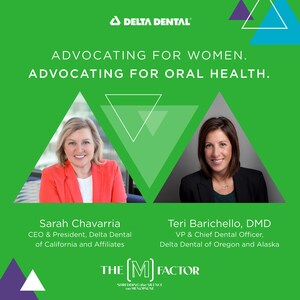From Smile to Hairstyle, What Influences Our Likability of Presidential Candidates?
New Analysis Shows What Americans Are Paying Attention to & What Impacts Their Views of the Candidates
OAK BROOK, Ill., Dec. 14, 2015 /PRNewswire-USNewswire/ -- Aside from a Presidential candidate's track record and opinions, what impacts their likability most? With campaign season in full swing, voters are paying close attention to a lot more than just what the candidates are saying. A new survey out today from Delta Dental Plans Association details other factors driving how voters feel about those running for President.
From smile to hairstyle and voice to wardrobe, the new survey breaks down some of the key qualities candidates may want to pay close attention to.
What voters say sways their likeability of a candidate:
Voice: The clear frontrunner. Nearly two in five (36%) Americans 18+ say a Presidential candidate's voice makes them more likable. The quality resonates particularly with voters in the Midwest, 43% of who say voice matters in affecting their likability (compared to the Northeast: 39%, West: 36%, and South: 32%).
Smile: Clinching second place. 17% of voting age Americans says a candidate's smile makes them more likable. Women (19%) are only slightly more likely than men (16%) to say the candidate's smile makes them more likeable. A Presidential candidate's smile matters most to those in the West (23%), followed by Midwest (18%), Northeast (17%) and the South (14%). More parents than non-parents (23% vs. 15%) say a smile impacts a candidate's likability.
Wardrobe: A distant third. How the candidates dress sways their likability with 6% of American adults, according to the survey. The issue matters slightly more to men (7%) than women (5%) and ranks highest with older millennials (25-34 year olds) at 9% compared to other age groups. A candidate's smile has a slight edge in the South (7%) and Northeast (7%) compared to the Midwest (5%) and the West (4%).
Hair: Haircut or hairstyle comes in dead last in likability factors at just 4%. However, when it comes to younger millennials (18-24 year olds), the issue matters to 13% - nearly triple and quadruple other age groups.
About the survey: The survey was conducted by Kelton Global between October 26th and 29th, 2015 among 1,013 nationally representative Americans 18+. The margin of error is +/-3.1 percent.
Follow us on Twitter @DeltaDental and Facebook: Delta Dental Plans Association
About Delta Dental Plans Association
The nonprofit Delta Dental Plans Association, based in Oak Brook, Ill., is the national association of Delta Dental member companies, which collectively make up the nation's leading dental benefits provider, with enrollment of 68 million Americans. For more information, visit our website at deltadental.com.
SOURCE Delta Dental Plans Association
Related Links
WANT YOUR COMPANY'S NEWS FEATURED ON PRNEWSWIRE.COM?
Newsrooms &
Influencers
Digital Media
Outlets
Journalists
Opted In






Share this article